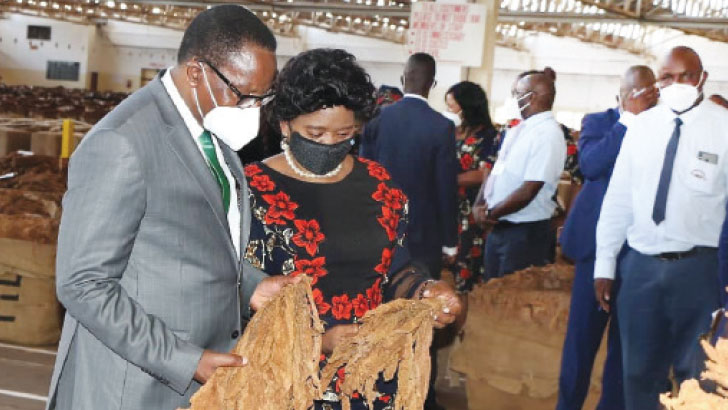Prepare for life without tobacco—Chakwera
P
resident Lazarus Chakwera says tobacco farmers and industry stakeholders should accept the harsh reality that the tobacco industry is dying and start preparing for life without tobacco.
In his address marking the opening of the 2021 Tobacco Marketing Season at Lilongwe Auction Floors, the President called for the need to accept that things “are not well with the tobacco industry” at the moment.
His remarks come at a time when earnings from the country’s major foreign exchange earner have been declining, affecting the economy as manifested by a shaky foreign exchange position.

Said Chakwera : “What must be said and accepted is that our tobacco industry is dying, and we need an exit strategy to transition our farmers to crops that are more sustainable and more profitable.
“I am, therefore, calling on the Minister of Agriculture to begin consultations with all stakeholders and come up with a timeframe within which Malawi’s economy will be completely weaned off tobacco.”
National Statistical Office (NSO) figures indicate that the country’s tobacco earnings have declined by about 45 percent in 10 years, from $433 million (about K325 billion) in 2009 to $237 million in 2019.
In 2020, the country sold 112.89 million kilogramme (kg) of tobacco compared to 165.67 million kg in 2019.
From such a volume, the country earned $174 million (about K134 billion) against $237 million (about K182 billion) earned in 2019; hence, representing a 27 percent plunge.
Despite the drop in revenue, the market saw a marginal increase in the average price to $1.54 (about K1 185) per kg compared to $1.43 (about K1 101) per kg in the 2019 marketing season.
The market dynamics last year mirrored the conduct of the market in 2012 when $176.87 million (K135 billion) was realised against a revenue of $293 million (about K222 billion) earned in 2011, thus representing a 40 percent drop in revenue.
The sharp decline from the crop is attributed to the anti-smoking lobby championed by the World Health Organisation’s Framework Convention on Tobacco Control (WHO-FCTC) guidelines as well as the introduction of stiff production regulations that require all processes in the production value chain should be traced to do away with child labour and forced labour.
The latest blow that emerged in November 2019 was the World Release Order (WRO) by the United States Government which restricts tobacco from Malawi due to child and forced labour concerns.
Currently, only Alliance One Tobacco and Limbe Leaf are buying companies allowed to export to the US, having been cleared to have been producing tobacco in compliance with regulations.
Chakwera acknowledged that there are three harsh realities that all industry stakeholders must face head on and work together to address, including low bargaining power on the part of growers within the industry, poor regulation of the tobacco sector as well as declining demand for tobacco across the globe.
On the sharp decline in demand for tobacco, the President called on the Ministry of Agriculture to develop a strategy for preparing farmers for a more prosperous future built on other commercial crops that are more profitable and sustainable.
On the imbalance in bargaining power, Chakwera reminded stakeholders that the farmer is responsible for production, saying in any healthy industry, producers have a lot of bargaining power, which is not the case for Malawi’s tobacco farmers who are suffering injustices.
He also touched on poor regulation, saying the Tobacco Industry Act of 2019 is falling short of fair enforcement among all stakeholders, urging stakeholders to address all the imperfections in the law by taking their grievances to the Ministry of Agriculture for redress.
The President further observed that crops such as nuts, jatropha, and industrial hemp can be promoted as tobacco alternatives.
During the launch yesterday, the highest tobacco price on the auction floors was $1.50 while the lowest was $0.90 per kg, compared to last year’s $1.20.
On the contract side, the highest price per kg was $2.40 compared to last year’s $2.30.
Earlier before Chakwera addressed the gathering, The Nation monitored price tags inside the floors and the general mood among stakeholders.
Generally, the market was also characterised by high rejection rate to the dismay of growers interviewed at the floors.
Joseph Kamwendo, a farmer from Njewa in Lilongwe District, observed that the prices were not different from last year’s.
For instance, he said the $0.90 has been a minimum price for a long time; hence, suggested the need to raise it above $1 per kg.
Another farmer, Mathews Katsukunya from Mtengowanthenga in Dowa District, expressed displeasure with the start of the season, saying he brought 11 bales, but only two were bought while the rest were rejected.
Tobacco Processors Association chairperson Hugh Saunders, who is Alliance One Tobacco chief executive officer, said while he welcomed government’s call to improve on pricing, buyers operate independently; hence, he could not speak for everyone.
Tama Farmers Trust president Abel Kalima Banda said while the first day started slow, farmers should hope for improvements in coming days.
Minister of Agriculture Lobin Lowe challenged buyers to improve on price offering, promising that his ministry will implement the presidential directives.






One Comment